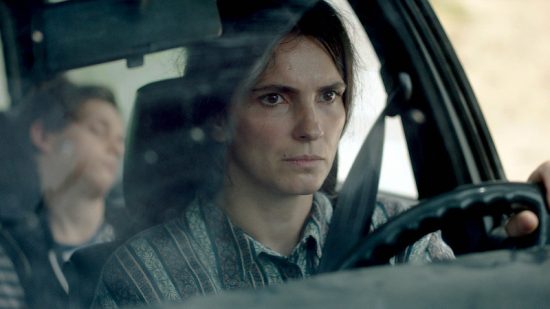Sundance 2021 Review: Hive – “A quiet and reflective film”

Yllka Gashi appears in Hive by Blerta Basholli, an official selection of the World Cinema Dramatic Competition at the 2021 Sundance Film Festival. Courtesy of Sundance Institute | photo by Alexander Bloom
Hive, writer and director Blerta Basholli‘s debut feature film, had a very successful Sundance pretty well sweeping the World Dramatic Competition, winning the Audience Award, Grand Jury Prize, and the Directing Award. It’s a formidable accomplishment, especially for a first feature, yet it’s easy to see why audiences and jurors connected with Hive. Based on a true story, it tells a tale about grief, independence, and pushing back against the patriarchy to take control of one’s future.
Fahrije (Yllka Gashi) is like many women in her village of Krusha, anxious of news about her husband, but after years of him being missing, she seems to understand that this news is likely only going to bring closure. In 1999, during the Kosovo War, Serbian forces entered the town and as they burned the village’s buildings they separated the men and boys, many of whom were killed, others of whom disappeared. As the missing men in their families were completely responsible for the financial security of their households, a women’s group began providing monetary donations to those in need. But those donations are starting to dry up, and the women’s organization starts to encourage its members to get driver’s licenses in order to travel outside of Krusha for jobs and to gain some independence.
Only Fahrije takes the driving lessons and is the only woman in the room taking the written test. The other women in the village are worried about the town gossiping of their impropriety, as they are not supposed to drive. Some that still have husbands at home, are threatened by them. But Fahrije takes this chance. The only money she was earning producing honey from her husband’s bee colony is minimal, her children are growing up, and she also has her father-in-law, Haxhi (Cun Lajci) living at home who needs care. Even as Haxhi admonishes her decision telling her, “You have to know your place in the family,” Fahrije drives to the city of Pristina for work. Eventually she manages to start a small business making ajvar (a condiment made from red peppers) and selling it in one of the city’s grocery stores. As she endures name calling and even physical threats from the men back in the village, slowly but surely the women in the community all start to pitch in, empowering them to be self reliant and pushing back against the status quo that has worked to oppress them for so long.
The performance of lead Yllka Gashi in this film is one of stoic determination. Restrained and solemn for most of the film, even amongst the side eyed glances and disapproval Fahrije receives from her fellow townspeople, she is unflinching. Yet there are moments of emotion that crack through Fahrije’s stone exterior and Gashi lets those carefully through, just enough to let us know the toll these decisions and the reactions they provoke are taking on this woman.
For a debut, Basholli has created a quiet and reflective film. It’s modest in its execution but not in its overall message. Despite an ending that should be seen as uplifting and hopeful, the overall feeling from this film is still one of uneasiness and apprehension for Fahrije’s experiences and what she likely still experiences in a community built and relying on patriarchal values. Hive is a somber, I’d even say bleak, film, one that builds slowly, but is no less compelling in its reminder of the freedoms that we take for granted.









